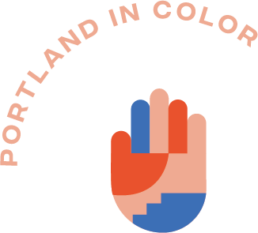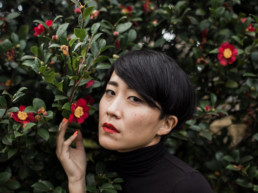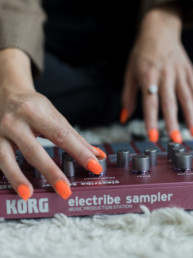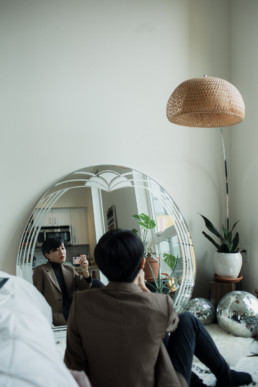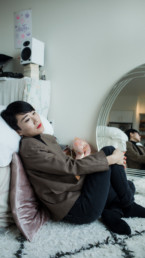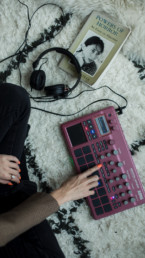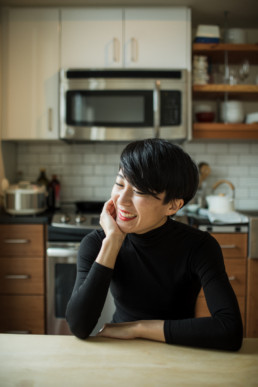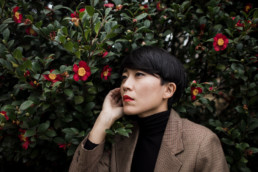CAY HORIUCHI
“I believe in dancing as an act of rebellion.”
Name: Cay Horiuchi
Pronouns: They/them
Background: Queer non-binary Japanese American
Astrological signs: Taurus sun, Cancer rising, Virgo moon
Medium of choice: DJ, visual art, community organizing
Karaoke jam: I’m terrified of singing, but I’ll play you “Microwave” by Kyoko Koizumi anytime!
What’s one of your favorite Portland memories?
Being at CornCon2017—an annual corn convention hosted by a local comedian and musician, Jen Tam, featuring many under-represented Portland QTPOC talents. We were surrounded by many talented, driven artists and community organizers on a beautiful summer evening, and I couldn’t be much happier.
“Often times, I end up not going to certain events because of how unsafe it feels at certain venues or events. This is simply the luxury I do not have due to the oppression and a number of assaults we face as queer [people] of color.”
Can you please share a time it was difficult living in Portland?
I will discuss dance music scene specific examples [as] this has been an ongoing conversation since my teammates [and I] co-founded C.A.R.E.S., a collaborative project to create a safer dance floor, back in 2013. However, please note that this can be applied to any professional environment, including non-profits, and any community making an effort to be more inclusive and to diversify their communities.
As a member of the QTPOC community, I find it extremely difficult to find a safe space or parties to go out to. Often times, I end up not going to certain events because of how unsafe it feels at certain venues or events. This is simply the luxury I do not have due to the oppression and a number of assaults we face as queer [people] of color.
I believe in dancing as an act of rebellion. I believe that music has the power to build and strengthen a community outside of the societal norm. In the United States, BIPOC and queer communities have been carving these spaces independent of the society that does not welcome us. A safe dance floor space is where can freely express ourselves without our minds or bodies being invaded by others or the oppressive system. And yet still to this day, we find our bodies violated by others, especially by self-proclaimed feminists and “allies” over and over again even in “safe” queer spaces. Further, these dance floors have been monopolized and heavily capitalized by cis white men with the wakes of dance music becoming more mainstream.
I find it the most difficult when having a conversation regarding equity and inclusion with cis white community members. They tend to be blinded by the idealism that they believe in, guarded by a high level of defensiveness, while having no understanding of how much work and listening it actually takes to them create such spaces.
When I share my criticism or a simple question such as “are there any womxn in your lineup?” I often receive a shocking amount of “But we are inclusive,” [and] “You are being negative” type comments. If you sincerely wish to make a progress in your community through the underground dance music scene, why does it seem impossible to be aware of the gap between your intentions and actions?
How do you stay inspired in Portland and within your community?
I finally found a strong, loving, and supportive POC community after living in this town for several years. I’m eternally so grateful for our community. Without my friends, I would have been destroyed by the toxic whiteness of this city, to be honest. Things can be still challenging, but knowing that there is a community of people with similar struggles helps me feel seen and validated. Their strong, continuous, self-less support also made me want to become a supportive community member to them. They are the greatest source of my inspiration.
“If you sincerely wish to make a progress in your community through the underground dance music scene, why does it seem impossible to be aware of the gap between your intentions and actions?”
How can Portland support you and your community?
Get used to hearing criticisms from us. Learn how to process your guilty feelings without being at the expense of our emotional labor. Learn to say “I’m sorry” sooner than later, more often than ever. Make it a habit to pay us for our labor educating you. Your defensiveness and interrogation solely to extract answers that you want to hear from us is toxic and harmful.
This is just one example, but don’t tokenize one POC cis man who agrees with you. If you really want progress, and if you really want to be a compassionate and aware person, pay Black womxn. If they are down for it, pay them more so that they can share with you how you can do better for our community.
Representation matters. This applies not only [to] Hollywood or leadership in organizations. We need the city and its people to hire, promote, and provide creative platforms to more people of color. Being a self-claimed “anti-racist” or “feminist” is deceiving. Do not think it’s enough just because you have one POC board member or [in your] office or one POC talent [on] your event curation. Ask yourself why you feel it’s necessary to hold onto this power, status, and resource. Be critical of what you promised to do by being “inclusive” and “open.” Ask why there aren’t many POC participating in your events. Be open to critical voices—especially [from] QTPOC community members. Listen to us and work on yourself to make a change.
